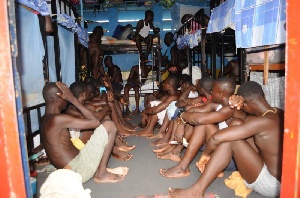- Home - News
- Elections 2024
- News Archive
- Crime & Punishment
- Politics
- Regional
- Editorial
- Health
- Ghanaians Abroad
- Tabloid
- Africa
- Religion
- Photo Archives
- Press Release
General News of Wednesday, 9 April 2025
Source: www.ghanawebbers.com
‘Our prisons can’t handle it’ – Deputy Minister defends deportation of foreign galamseyers
Deputy Interior Minister Ebenezer Terlarbi has acknowledged issues in Ghana’s criminal justice system. He stated that the government struggles to prosecute foreign nationals involved in illegal mining, known as galamsey.
In an interview on Joy News' PM Express, he defended a new directive from Interior Minister Muntaka Mubarak. This directive includes transferring police commanders in mining areas and deporting arrested foreign nationals immediately.
The policy has faced strong criticism from civil society and opposition leaders. Critics argue it shows a double standard in law enforcement. They believe it undermines Ghana’s efforts against transnational crime.
Terlarbi noted that litigation can be frustrating in Ghana's courts. He mentioned instances where authorities prefer repatriating arrested individuals instead of going through legal processes.
He explained that the system is not equipped to handle the burden of prosecuting many foreign nationals at once. For example, if 80 Chinese nationals are arrested, finding space for them becomes challenging.
He added that transporting them to court can also be problematic. Often, these individuals succeed in getting bail after appearing in court.
While Ghanaians arrested for similar offenses go through legal processes, Terlarbi said this cannot apply universally due to capacity issues.
When asked about potential double standards, he admitted there might be some truth to it but emphasized undisclosed factors at play behind the scenes.
He stressed that this approach is not about leniency towards foreign offenders but about practicality within an overwhelmed system. Currently, there are 1,400 inmates in custody, making feeding them a challenge.
If sending foreign offenders back home helps alleviate pressure on the system, he supports that option.
Terlarbi pointed out that some foreign nationals complicate prosecutions by refusing to provide identification. This makes establishing their identities difficult once they enter the system.
When questioned about setting a dangerous precedent by not prosecuting foreigners while insisting on legal procedures for Ghanaians, he urged realism. He argued that different situations require innovative solutions.
Despite concerns that deportation without consequences could encourage more crime, Terlarbi believes this approach is necessary given the current state of the system.
The host challenged him on whether it's fair to treat Ghanaians and foreigners differently regarding legal frustrations. Terlarbi responded simply: “Not really.”











